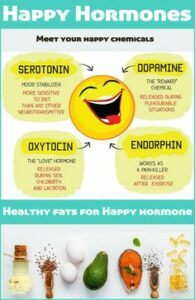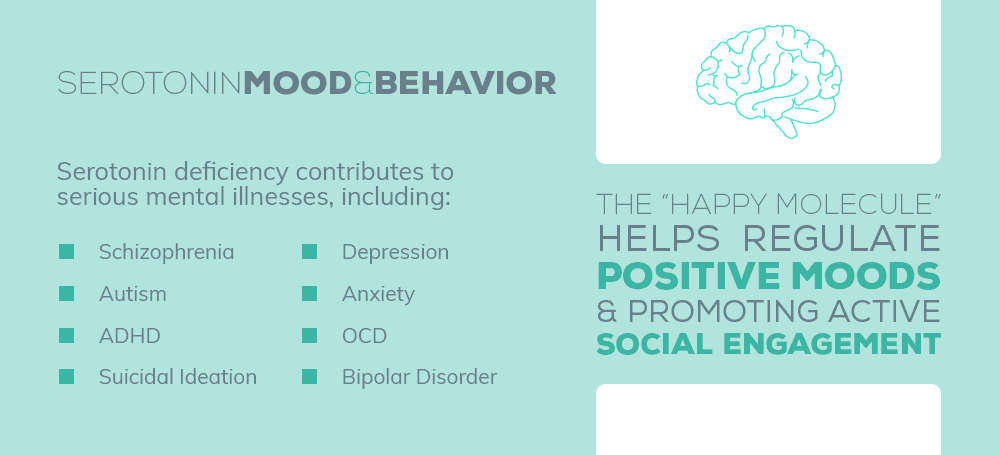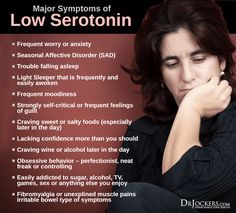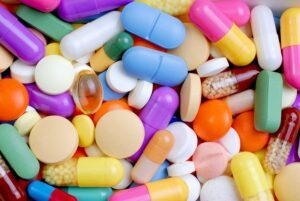Serotonin is a hormone that belongs to a family of hormones known as  “happy hormones.” This is because among a host of other functions, it has an influence on mood and sense of well-being. Come along as we look at Serotonin: The Facts.
“happy hormones.” This is because among a host of other functions, it has an influence on mood and sense of well-being. Come along as we look at Serotonin: The Facts.
What is Serotonin?
Serotonin is a neurotransmitter which carries signals between nerve cells throughout the body. It is also functions as a (hormone). For more information on hormones, read the article: The Importance of Hormones on this website.
Brain-derived serotonin (BDS) acts as a neurotransmitter, while gut-derived serotonin (GDS) acts as a hormone and regulates a wide range of functions.
What does Serotonin Do?
Mood – Serotonin’s effects in the brain are its most popular function because it helps regulate one’s mood. This is why serotonin is often called the body’s natural “feel-good” chemical. Serotonin’s effect on mood makes it one of numerous brain chemicals that are fundamental to our overall sense of well-being.
Serotonin’s effect on mood is also why it’s often a target of medications that are used to treat depression, anxiety, and other mood disorders.
For example, serotonin plays a starring role in treatments with the class of antidepressants known as selective serotonin reuptake inhibitors (SSRIs).
Digestion – Serotonin plays a role in normal bowel function and reduces the appetite as an individual eats to help them know when they’re full. Serotonin also plays a protective role in the gut.
For example, if someone were to eat something irritating or toxic, the gut would respond by producing more serotonin. The extra “dose” of the substance would remove the unwanted food along, expelling it from the body faster.
The response is also why increased levels of serotonin can make one nauseated and why drugs that target specific serotonin receptors can be used to alleviate nausea and vomiting.
Sleep – The precise nature of serotonin’s role in sleep has been disputed by researchers, but it’s believed to influence when, how much, and how well one sleeps. Serotonin does not regulate these tasks alone; other neurotransmitters like dopamine also play a key role. For more information on Dopamine, see the article: Facts about Dopamine on this website.
Another hormone named melatonin is also vital to the proper functioning of the sleep cycle. However, the body needs serotonin to make melatonin, so not having enough of serotonin (or having an excessive amount of it) can affect the pattern and quality of one’s sleep.
The brain has specific sections that control when someone falls asleep, regulate their sleep patterns, and wake them up. The areas of the brain that are responsible for regulating sleep additionally have serotonin receptors.
Also, note that the serotonin-melatonin relationship may additionally contribute to sleep disruptions such as insomnia that are common in individuals with depression.
Blood Clotting – When an individual has any kind of tissue damage, like a cut, the platelet cells in the blood release serotonin to help heal the wound. Increased serotonin levels cause the tiny arteries (known as arterioles) of the circulatory system to narrow. As they get smaller, blood flow slows.
This narrowing (known as vasoconstriction) and slowed blood flow are two crucial elements of blood clotting—a vital step in the process of wound healing.
Bone Density – Studies have shown that serotonin levels may influence bone density (the strength of the bones). Research also suggests that high circulating levels of serotonin in the gut might be associated with lower bone density and conditions such as osteoporosis.
Research suggests that a type of antidepressant that works on serotonin called selective serotonin reuptake inhibitors (SSRIs) is associated with decreased bone mineral density. Low bone density puts the body at a greater risk for fractures.
If you are worried about how taking an antidepressant could affect your bone density, do not refrain from taking your medication. Start by consulting with your doctor about other risk factors, such as having a family history of osteoporosis or smoking.
Sexual Function – In addition to altering one’s mood, serotonin can additionally influence the frequency and intensity of the sexual feelings one might you have.
Certain antidepressants that add to serotonin levels can have an effect on libido, as elevated serotonin levels have been associated with a decrease in sexual desire.
Serotonin’s influence on libido is also somewhat related to the neurotransmitter’s association to another chemical in the brain: dopamine. For instance, a 2017 study of women with hypoactive sexual desire disorder (HSDD) revealed that symptoms of the condition were associated with increased serotonin activity and reduced dopamine activity.
Causes of Low Serotonin Levels
Depression and other mood illnesses that are linked to serotonin are multi-factorial, meaning there is more than one reason they happen. Therefore, having low serotonin levels is not, by itself, enough to cause depression . However, low levels can contribute to sleep, mood, digestive, and other issues.
. However, low levels can contribute to sleep, mood, digestive, and other issues.
There’s no single cause of low serotonin levels, but it typically occurs for one of two reasons: not having enough serotonin or inefficient use of the serotonin produced.
In the first scenario, an individual may have low levels of serotonin because their body isn’t producing enough to maintain normal levels. In this case, the body may not be able to produce enough serotonin because of factors such as nutritional and vitamin deficiencies.
For example, low levels of vitamin B6 and vitamin D have both been linked to decreased levels of serotonin. Also, Tryptophan, an essential amino acid involved in serotonin production, can only be obtained through diet.
The other reason one might have low serotonin is that while the body is producing serotonin, it is not using it effectively. This can happen if an individual doesn’t have enough serotonin receptors in their brain, or if the ones on hand don’t work well (for example, they break down and take in serotonin too rapidly).
Treating Serotonin Deficiency
Drugs
Antidepressants are a common treatment for depression. Depression is known to be associated with chemical imbalances in the brain. Although serotonin’s role in depression is more complicated than an imbalance, it is thought to play a significant function.
The theory of how serotonin affects the brain and causes depression is the  starting point for many drugs used to treat clinical depression and other mood disorders.
starting point for many drugs used to treat clinical depression and other mood disorders.
One of the most popular types is selective serotonin reuptake inhibitors (SSRIs).
SSRIs are the most frequently prescribed antidepressants globally. These drugs are used to reduce the symptoms of moderate to severe depression by escalating the amount of serotonin in the brain.
When brain cells send signals to one another, they release neurotransmitters that include serotonin. Before they can send the next signal, the cells must reabsorb and recycle the hormones they released. This process is called reuptake. SSRIs make added serotonin obtainable within the brain by plugging the serotonin reuptake process.
Another group of serotonin-based medications for treating depression is understood as serotonin-norepinephrine reuptake inhibitors (SNRIs). These drugs work similarly to SSRIs in that they block the reuptake of serotonin, but they also work on norepinephrine, another neurotransmitter that affects mood.
Two older groups of antidepressants also affect serotonin levels: tricyclic antidepressants (TCAs) and monoamine oxidase inhibitors (MAOIs).
TCAs appear to block the reabsorption of serotonin and epinephrine, which effectively increases the amounts available in the brain.
MAOIs, conversely, block the effects of the monoamine oxidase enzyme, which breaks down serotonin, epinephrine, and dopamine. Preventing these neurotransmitters from being broken down effectively increases the amounts available in the brain.
Treating Serotonin Deficiency Naturally
In addition to prescription antidepressant medications, there are additionally natural ways to increase serotonin levels. Everything from the food individuals eat to how much sunlight they get can affect how much serotonin the body has, as well as how efficiently it can use it.
Diet – Numerous foods naturally have serotonin, but the body additionally needs supplementary nutrients, such as tryptophan, vitamin D, vitamin B6, and omega-3 fatty acids, to produce this serotonin.
Foods that are good sources of these key nutrients include:
- Leafy greens (such as spinach, kale)
- Bananas
- Turkey
- Nuts and seeds (such as walnuts, flaxseed)Beans (such as chickpeas,
 kidney, pinto, black beans)
kidney, pinto, black beans) - Eggs
- Oily, fatty fish (such as salmon, tuna, mackerel)
- Probiotic/fermented foods (such as kefir, yogurt, tofu)
Eating a high-fiber diet that is heavy in fruits and vegetables will help keep an individual’s gut bacteria healthy. Having a good balance of friendly bacteria in the intestines has been linked to adequate serotonin levels (as the intestines make about 95% of your body’s supply of serotonin)
Exposure to light – Levels of serotonin may decrease and become low if we don’t get out in the sun regularly. Not getting enough exposure to sunlight is one theory behind the reasoning of why people encounter depression during the short, dark days of fall and winter (a mood disorder called seasonal affective disorder)
It’s best to try to spend 10 to 15 minutes outside in the sun each day. Sunlight also boosts vitamin D levels, which is needed for serotonin production.
If one resides in a place with little to no sunlight, they can also use light therapy to make sure they’re getting their daily dose of sunlight.
Exercise – Regular physical activity (particularly aerobic exercise) has been proven to boost serotonin levels. However, the advantages of normal-regular exercise go beyond your brain.
A workout can assist individuals control depression and other mood disorders by additionally promoting cardiovascular health, improving strength and endurance, and helping to sustain a healthy weight.
The Department of Health and Human Services President’s Council on Sports, Fitness, and Nutrition advises that adults obtain at least 150 minutes of moderate-intensity cardio exercise each week plus two days of strength training.
Be sure to talk to your doctor before starting an exercise routine. Be sure to pick activities that you enjoy as you’ll be more likely to stick with it, and regularity is vital to getting all the benefits.
Massage – Massage therapy has been established to advance the release of serotonin and decrease the stress hormone cortisol, making it an interesting non-pharmaceutical addition to depression and anxiety treatment plans. One does not need a professional massage to harvest the benefits.
A commonly referenced study of pregnant women with depression published in the International Journal of Neuroscience
in 2004 reached the conclusion that a massage could be beneficial even when given by someone who isn’t a trained massage therapist. After contributors to the study had two (2) 20-minute massage sessions given by their partners, their serotonin levels increased by 28% and their dopamine levels by 31%.
Supplements – Research has shown that nutritional insufficiencies are widespread in individuals with low serotonin levels. In particularly, they frequently lack the crucial nutrients the body requires to make serotonin and other substances.
While you can improve your overall nutrition through your diet, certain supplements also can be helpful. Popular dietary supplements you might want consider include:
- Pure tryptophan
- 5-HTP
- St. John’s wort
- Probiotics
- SAMe (S-adenosyl-L-methionine)
If you need an excellent on-line source for supplements, check out the Vitamin Shoppe by clicking here.
When your body doesn’t have enough serotonin, or if it isn’t using the serotonin you have efficiently, you might be more inclined to indicators of depression and other mood disorders. And while inadequate levels of serotonin can cause problems, having excessive levels of serotonin can also be a problem.
If you’re concerned about symptoms you’re experiencing, consult with your doctor. If your serotonin levels are a problem, you are not by yourself and there are many treatment options available from medications to lifestyle changes.
For questions, comments, or concerns, feel free to leave them below.
Good Health!
Thanks for sharing facts about Seratonin. All I know was that seratonin is good and cortisol is bad. Wow, I had no idea that seratonin plays a part in digestion as well, but it makes sense. And it effects our bone density too? How would I know that? I am glad that I already start eating all the foods that promote seratonin, phew! Love the information and to the good health!
Hi Nuttanee – Yes, hormones are busy little beavers. We can’t live without them! Thanks for stoppiing by and commenting.
I first heard about Serotonin and the rest of the happy hormones watching a video of an influencer. I was even thinking about writing on the “Happy Hormones” topic, it is very important to learn about them and how they affect us during our daily routines. I didn’t know that much about serotonin, the facts you uncovered here are a MUST know. I think understanding how these things work is important to our success. Knowing how you get happy can help you do activities to trigger that, then this plays an important role in the learning process.
Absolutely – once we know what contributes to our happiness, we an keep it going. Thanks for commenting!
The happy hormone, this is the first time that I have heard of this product but if what you have said about this product is true based on your research then I think it is worth giving a try especially if it benefits the body in that way by making you feel good and well relaxed it is worth giving a try. We should do all that we can to maintain good health and if this product offers help then this is a good investment.
Hi Norman – Serotonin that I wrote about isn’t a product, it’s a natural hormone produced by the body. But if an individual has a deficiency they can purchase supplements.